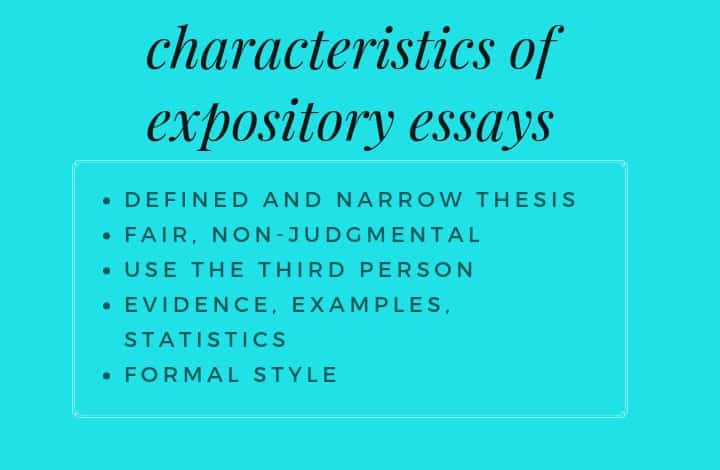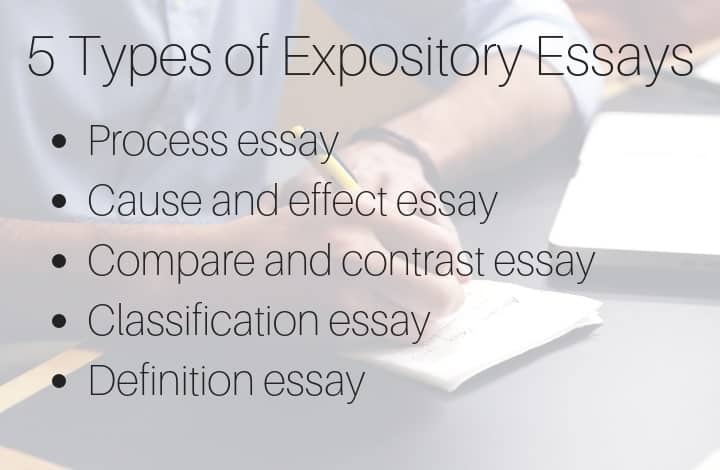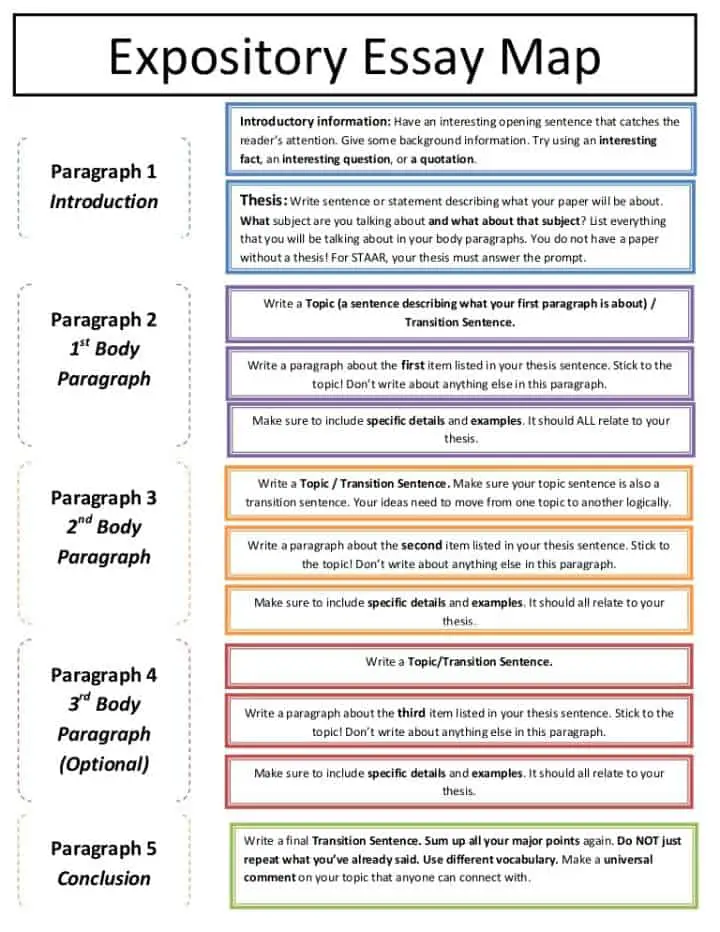
By diving into this guide, you’ll surface as an expository essay maestro!
Writing isn’t just an academic task; it’s an art and a journey. With expository writing, you’re not merely throwing out information. Instead, you’re casting a light, illuminating the vast universe of your readers’ curiosity. And this guide? It’s your trusty compass, pointing the way.
In this article you’ll find information on:
- The definition of expository writing.
- FAQ about expository essays.
- Topics and examples of essays.
- How to format an essay.
- Essays to write at different levels of education.
- Different types of expository writing.
- Crafting your thesis.
- The step-by-step process for writing an essay.
What is an expository essay?
According to the dictionary, expository means “serving to expound or set forth”. When the word first appeared in England in the 15th century, it meant a commentary on a particular subject. A few words in the same category are “informative, instructive, didactic, and descriptive”. As you can already imagine, an expository essay is a piece of writing where you talk at length about an important idea, present evidence, and build an argument about that idea in a clear, impartial, and easily understandable way.

Characteristics of an expository essay:
It explains or informs the reader about:
- how to do something
- why something happened
- how something works
- why something should be done
- or what something is
Moreover:
- It’s written from the third person’s perspective (using “it” “he” “she” and “they”)
- It’s not about your personal opinion. Rather, it’s about informing the reader in an objective, non-biased manner by providing facts, examples, graphs, descriptive details, charts, and statistics.
- It’s written in a formal style (but this depends on your target audience)
- It’s written in a serious tone (no colloquialisms).
A few sample topics:
- What does it take to become an Olympic athlete?
- What are the temperamental differences between democrats and republicans?
- How does a laser work?
- What kind of a role diet plays in the weight loss process?

Expository Essays – 7 Most Frequently Asked Questions
1. How should you format your essay?
An expository essay usually consists of five paragraphs:
Introduction (1 paragraph)
What’s the purpose of this part?
- Grab the attention of the reader.
- Give a brief introduction to the topic.
- Present the topic sentence (thesis) clearly and concisely.
- Quickly present the main ideas you will share in the body of your essay.
The body of the essay (3 paragraphs)
What’s the purpose of this part?
- Start each paragraph with a topic sentence where you tell your reader about the “first big idea”. After that, you provide supporting evidence for this idea.
- In the next paragraph, you present the “second big idea” plus the supporting evidence, and then you repeat the same pattern in the third paragraph.
- Each of these body paragraphs needs to be tightly related to the overall thesis. They should be telling a consistent story, so to speak.
- Give reasons, arguments, and specific examples in support of your thesis.
- Make sure that your essay flows smoothly by including a transition sentence at the beginning of each new paragraph.
- Note: If you’re writing a longer essay, you’ll usually expand the body section by adding one or two more paragraphs.
Conclusion (1 paragraph)
What’s the purpose of this part?
- Sum up what you’ve said in the last three paragraphs (but do it originally, using different vocabulary).
- Restate your thesis.
- End with a bang (try to evoke an emotional response in the reader).
Here’s a quick graph that will show you which structure to use:
I also wrote a whole article about how to structure your essay.
2. Can you start your essay with a question?
It’s possible, but not recommendable. Starting your essay with a question looks too informal (especially if it’s a rhetorical one). It’s much better to get straight to the point and address the issue which you’ll discuss in your essay.
3. How long should your essay be?
The length of your essay depends on your assignment and the level of your education. Between primary school and high school, essays can usually fit into a single A4 page. If you’re applying to a university, you’ll have to write a 650-word long essay which is just a bit more than one A4 page. If you study liberal arts at a university, you may be asked to write an essay that’s a couple of pages long. Then you would add more paragraphs to the body of your work. Sometimes your professors will give you a range (for example – between 500 – 550 words). Always do your best to stay within that range. Regardless of length, the format stays roughly the same and is comprised of three parts: introduction, body, and conclusion.
4. How is an expository essay different from a persuasive, argumentative, or analytical one?
In the expository essay, you talk at length about a specific subject. The main purpose is to provide as much relevant information as possible objectively. An Argumentative (or persuasive) essay is different because as the name suggests, its purpose is to change the mind of the reader and persuade them to change their mind and start taking different types of action. An analytical essay, on the other hand, is about analyzing, critiquing, and interpreting a specific event, painting, poem, song, or work of art. It’s narrower in scope than the expository one.
5. Can your essay be written from the first person’s point of view?
Not really. Expository work is a bit more serious so you should avoid saying “I” or “you”. Your job is to be an objective judge, presenting well-constructed evidence in support of your thesis. Use the third person’s perspective when providing information (he, she, it, they).
6. What kind of tone and style should you use?
Most of the time you should use a more formal and serious style of writing. You’re discussing weighty matters with the reader and this calls for grace and equilibrium. But it also depends on the audience you’re addressing. If you’re writing for young readers, you could choose a more informal approach.
7. How can I find sources to cite in my essays?
You need to find the best sources available on the topic and let them support your thesis. Make sure that the sources you use (articles, books, academic research, historical documents) are fully legitimate. You don’t want to be quoting any unreliable texts.
Before including a source, be sure about:
- Author’s credentials
- Publisher’s reputation
- The number of sources and citations the author includes in her work
- Political bias (hidden agenda) – make sure your source is objective
- The date of publication – make sure your source is not outdated
5 Different types of expository essays:
There are five main sub-categories of expository essays. Before starting to write your assignment, make sure you know which one are you going to focus on (if not sure, consult your teacher or professor).

Process Essay
This is a “how-to” type of essay where you describe a step-by-step process of accomplishing a certain task. The goal is to instruct the reader on how to do something.
Cause and Effect Essay
This style of writing is about interrelated occurrences that depend on each other. One (cause) has a direct (or non-direct) effect on the other. The goal is to describe this causal relationship in detail and determine the extent of the correlation. This essay type is scientific.
Compare and Contrast Essay
As the name suggests, this essay is about comparing two (or more) different things, people, events, or works of art. The aim is to highlight similarities and discuss differences.
Classification Essay
This essay is about breaking down a specific subject into smaller categories or groups. The goal is to move from general to specific.
Definition Essay
This essay type deals with the meaning of a word, concept, or term. While you can define concrete terms, often you’ll deal with abstract concepts like love or hate. Along with a formal definition, you’ll discuss the context and connotations of the word.
When do you need to write an expository essay?
They’re assigned as a mandatory piece of written work at all levels of the educational system. 1st grade, 2nd grade, 3rd grade – developing basic writing skills. Here you can find writing prompts for the 1st, 2nd, and 3rd grades. 4th grade – preparing for middle school. Here are some writing prompts and tips for the 4th grade. 5th grade – here the students may already tackle more advanced topics. Here are some writing prompts for the 5th grade. 6th grade, 7th grade, 8th grade, 9th grade – here the students slowly prepare for higher levels of education and are expected to follow the formal structure of the essay. Here you can find some writing prompts for middle school essays. 10th, 11th, and 12th grade – here the students prepare to write the college admission essay. Here are fifteen different topic ideas for high school students. College and University – here the students are expected to follow the strict format and show exceptional writing skills. Here are some ideas for essay topics at the university level.
Expository essays – topics and examples
Below you’ll find ten samples of topics you can use to write your essay:
1. How political systems affect levels of entrepreneurship around the world. 2. Why “selfie” is so popular and what does it say about modern culture? 3. How physical exercise can help to cure depression. 4. What are the biochemical reasons for addictive behavior in humans? 5. How to face the problem of police brutality. 6. How does learning foreign languages affect cognitive development in children? 7. The most prevalent diseases across the centuries. 8. The future of the institution of marriage. 9. The most significant movies of the XX century. 10. How the Mediterranean diet is healthier than a traditional USA diet.
Here are some examples of expository essays written by famous authors:
- Michel de Montaigne – Essays
- Francis Bacon – Essays
- John Locke – Essay Concerning Human Understanding
- Alexander Pope – Essay on Criticism, Essay on Man
- David Hume – Essays Moral and Political
- Ralph Waldo Emerson – Essays
- William James – Essays in Radical Empiricism
- Alfred North Whitehead – The Aims of Education and Other Essays
Also, I’ve created a lengthy list of examples of famous essays. And here are some more examples of successful essays written by college-bound students.

Best tips for writing an expository essay:
1. Start with your thesis
Your thesis statement is the most important sentence in your essay. Unlike in other types of essays, in expository work, you don’t have to argue for anything or prove anything. Your job is to provide valuable information clearly and succinctly.
- Don’t make extraordinary claims.
- Don’t argue.
- Don’t try to prove anything.
- Don’t share your opinion.
Focus on facts and be an unbiased judge. Remember that once you have your thesis in place, it will determine the scope of your essay.
How to craft a thesis:
- a) You may have a writing prompt from your teacher. If that’s the case, do your best to follow it.
- b) If you have to develop your topic, define it carefully and make sure it’s narrow enough to fit into five paragraphs.
- c) Do the research and take notes. Before you start, research the subject a bit to make sure you’re attacking it from the right angle.
- d) Boil your research down into a singular topic you want to address. This will be your thesis.
Here are a few examples of solid thesis statements (note how objective, narrow, and neutral they are):
- The development of the assembly line at the beginning of the XX century was one of the factors, which helped the USA to become a superpower.
- Regular cardiovascular exercise diminishes the risk of heart attack among elderly people.
- The social media channels like Facebook or Twitter lead to addictive behaviors in adolescents.
- The Boston Tea Party was a significant act of civil disobedience that galvanized Americans around the issue of taxation without representation and helped spark the Revolutionary War.
For more information on the topic of a thesis, please read this article.
2. Compile good notes and resources
The more research you do in the beginning, the better your essay will be at the end. Gather as much information as possible. Have more than you need so that you can use it strategically throughout your body paragraphs.
Your resources may consist of:
- Anecdotes
- Comparisons
- Quotations
- Statistics
- Descriptive details
- Definitions
- Charts and graphs
Remember, your essay is didactic and scientific so provide as much evidence and hard facts as possible.
3. Organize an outline for your essay
You already know that your essay needs to be formatted in a certain way and that it needs to be five paragraphs long. But you also need to organize your ideas logically.
That’s where the outline comes in.
- What are you going to write about first?
- What’s coming after that?
- Which statistics and quotes do you want to include, and where?
- What supporting evidence will you provide for your main ideas?
Jot down a simple plan on a piece of paper before you start writing.
4. Write your first draft
Now it’s time to fill out your outline with great language, high style, and lots of supporting evidence. Write according to the format and specifications described above (and perhaps, provided by your teacher). Don’t focus on grammar, spelling, or punctuation yet. Just get your ideas down on paper or screen. The editing part comes later.
5. Revise and polish your draft
After you wrestle the first draft down to paper, give it a bit of room to breathe. Leave it alone for a few minutes or a few hours. When you come back to it, you’ll be able to see it more objectively. Then you can sit down and take care of language, punctuation, syntax, vocabulary, grammar, and all the little details that make for a solid piece of writing.
6. Finish strong with a conclusion and restate your thesis
After you state your thesis, give a brief introduction, and present your ideas in the body paragraphs, it’s time to sum everything up. The job of the concluding paragraph is to reaffirm your thesis originally (so you don’t repeat yourself) and finish the essay to make a strong impression on the reader. Maybe you won’t be able to leave your audience with jaws open like at the end of an epic movie, but ideally, that’s what you should strive for. How did you enjoy this article? Are you feeling more prepared to craft your magnum-opus piece of writing? Next up, you may want to explore a guide with the keys to academic success.
Hey there, welcome to my blog! I'm a full-time entrepreneur building two companies, a digital marketer, and a content creator with 10+ years of experience. I started RafalReyzer.com to provide you with great tools and strategies you can use to become a proficient digital marketer and achieve freedom through online creativity. My site is a one-stop shop for digital marketers, and content enthusiasts who want to be independent, earn more money, and create beautiful things. Explore my journey here, and don't forget to get in touch if you need help with digital marketing.


